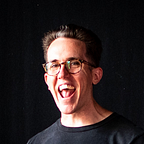When it comes to the most important things, I have no words. Much of my writing is in orbit of some nameless and formless thing that makes its presence known only through gravity; it is the psychic equivalent of dark matter. Like a figure in pursuit of the horizon, I will never get where i’m going, though it will keep me in motion.
This year, we witnessed Brexit, Trump, and Hanson. Paul Krugman asks if the U.S. is a failed state. The collapse of liberal democracy as the primary mode of political organisation in the West is entirely possible. Sceptical but serious left-wing thinkers invite us to seriously reconsider the whole project, some even going as far as supporting Trump to accelerate a desired revolution. Our unstoppable march towards the abyss of environmental destruction continues. Our downright creepy technophile culture threatens our basic conceptions of work and is even changing our ontology. Eavesdropping in cafes or simply white-collar work have started to feel like absurd, nauseous experiences, rather than human and life-affirming ones.
Processing what all this means takes up a great deal of my psychic energy, and I don’t have any answers. What I do have are some way posts in the fog and a tether around my waist. Whenever I get scared, afraid, or hopeless — which is often — I find myself coming back to a small handful of books, articles, and ideas.
I wouldn’t dare presume these are helpful for everyone, but they’ve been enormously helpful to me. They are sequenced in to three sections that loosely track the abandonment of our delusions, the (re)discovery of our love for the world, and how that love can sustain hope and action.
Forget your delusions
My first way post began with an honest pessimism, and I feel that my ability to deal with the crises of the modern world came about due to first passing through this deep valley. Although these first few resources are not positive or optimistic in the traditional sense, the deflation of our illusions is always therapeutic, and provides the ground for honest reassessment. In sequence, each of the resources below invites us to abandon our commonly held conceptions of our humanity, of ourselves, of our planet, and of our sense of purpose.
- Forget Your Delusions and Be Happy — John Gray (article).
- Stop Trying to Find Yourself — Michael Puett and Christine Gross-Loh (article).
- It’s the End of the World as We Know It — on Paul Kingsnorth (article)
- The Meaning of Life — John Vervaeke and Jordan Peterson (video).
A wild love for the world
Free from the belief that things are or should be a certain way, we have permission to love things as they are. Echoing Camus’ contention that “Those who prefer their principles over their happiness, they refuse to be happy outside the conditions they seem to have attached to their happiness,” these incredibly life-affirming pieces give us permission to begin loving things as they are. This isn’t easy, however, and requires the faculty of attention. As William James, pioneering Psychologist described, “The faculty of voluntarily bringing back a wandering attention over and over again is the very root of judgement, character, and will.” The three pieces below show us how to love our world, ourselves, and each other as we are now.
- A Wild Love for the World — Joanna Macy & Krista Tippett (podcast)
- How to Make Yourself a Better Person — Alan Watts (speech)
- This is Water — David Foster Wallace (speech)
Hope in the dark
That action can occur under conditions of pessimism, hopelessness, and powerlessness seems counter-intuitive — but it can. Hope in the Dark — an exuberant read (if you read one thing on this list, read this) argues that the essential pre-condition for hope is not optimism, but uncertainty: “Hope is a gift you don’t have to surrender.” Lincoln’s Melancholy argues that what we know today as depression has the potential to be not an affliction, but an enormously generative tool for empathy and action. Finally, Bob Brown’s Optimism shows how action is sustained by gentle appreciation, humour, and simply knowing that what we’re doing is the right thing—that optimism is a state of mind and is not contingent on a belief that we must succeed.
- Hope in the Dark — Rebecca Solnit (book)
- Lincoln’s Melancholy — Joshua David Shenk (book)
- Optimism—Bob Brown (book).
I hope some of these are useful to you.
